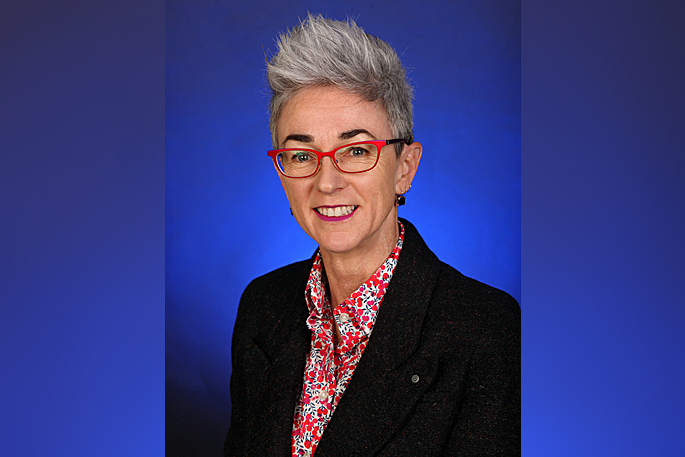Not even mountains will hold Professor Lynda Johnston back.
The self-professed geographer and mountaineer with ‘attitude and altitude' is off to experience some of the world's tallest peaks in the Himalayas before returning home to navigate the Kaimai Range, relocating from Hamilton to Tauranga.
After 18 years working for the University based in Hamilton, Lynda, a Professor of Geography in the Faculty of Arts and Social Science, is heading to the Bay and plans to explore Tauranga's urban diversity and socio-cultural differences, investigating how place and space influence the way people relate to, and interact with each other.
'As a human geographer interested in the interactions between people and place, my research always seeks to be transformative. Geographers are very well placed to offer solutions to complex global and local problems because of our ability to understand place as dynamic and ever-changing.”
Ever-changing is a befitting term for New Zealand's fastest growing city.
'Tauranga's population is changing rapidly due to local and global economies, and accelerated patterns of migration.
'Spatial proximity – in other words ‘living side by side' – can generate positive encounters yet it can also foster defensiveness.
'Paying attention to different social groups, in terms of gender, sexuality, race, religion/belief, disability, age, and social class, shows the way in which public space is shaped, lived, and contested.
'The project's findings will be used to understand how Tauranga can be an inclusive city,” she says.
Before she has a chance to settle into her rile at the University's new Tauranga Campus, Lynda is embracing a different kind of geography by accompanying four Waikato University Sir Edmund Hillary scholars, recipients of the Step Higher Award, to Khumbu Valley in Nepal where they will visit schools, interact with local communities, and trek to Ama Dablam Base Camp.
As an ex-mountaineer, and having climbed in Peru, the United States, Australia and Aotearoa, the extreme terrains and conditions of the Himalaya's don't faze her.
'Pushing my comfort zone is the norm for me! I'm totally dedicated to the students I'm accompanying – two of whom are from Tauranga, one from Rotorua, and one from Hamilton – and it's my goal to make sure they get the most out of the experience.”
After growing up in Otago, Lynda began tramping in the South Island at age 13 before moving onto rock, ice and mountain climbing at 17.
Aside from the numerous climbing experiences in her own backyard of Aotearoa, including Mount Cook, Mount Aspiring, Arthur's Pass and Fiordland's National Park, Lynda spent three months in the Cordillera Blanca in Peru, regularly climbing over 5000 metres.
Other climbing and hiking experiences include three months of intensive rock climbing in Australia and six months in Boulder, Colorado.
Over the years, Lynda has had a range of jobs that have all helped shaped her career, including Outward Bound instructing in the US, being a customs officer, sheep farming, retail and cleaning.
'This diversity of work experience has aided my understanding of place, people's access to resources, and wellbeing,” she says.
Her career is anything but linear, and while working at a university was something she never anticipated, her core principles of equity, justice and difference are all at the heart of her teaching, research and academic leadership.
Having published four books, two sole-authored and two jointly authored, nearly 50 journal articles, more than 20 book chapters, and numerous research reports, Lynda is internationally recognised as a researcher who works with and for marginalised communities, committed to social justice, equity and embodied difference.
Her research has focused on the ways various forms of discrimination and marginalisation, such as sexism, homophobia, transphobia, racism, and ableism, shape people's everyday geographies, structure the resources available to them, and influence who they become.
Lynda is President of the New Zealand Geographical Society and Chair of the Gender and Geography Commission of the International Geographical Union.
She discovered a love of geography in high school when a teacher taught her to see the world in different ways. She is now teaching her own students to do the same.
She has supervised more than 20 PhD and 15 masters students.
'Every day, I am inspired by students, whether they are first-year undergraduate or PhD students. They bring energy, ideas, and lived experiences to each learning environment. Guiding, encouraging, supporting and challenging students to think critically about our ever-changing world is hugely rewarding,” says Lynda.
Lynda is no stranger to the Bay. In her roles as Deputy Dean and Associate Dean Academic of Te Kura Kete Aronui (Faculty of Arts and Social Sciences), she has been part of the Tauranga Academic Working Group for the past two years, assisting with the development of academic programmes in region.
'Along with my colleagues and our communities, my focus is to increase the international profile and reputation of the University of Waikato in Tauranga. I'm keen to see that our excellent teaching and research meets the needs of people in the Bay of Plenty region,” she says.



0 comments
Leave a Comment
You must be logged in to make a comment.